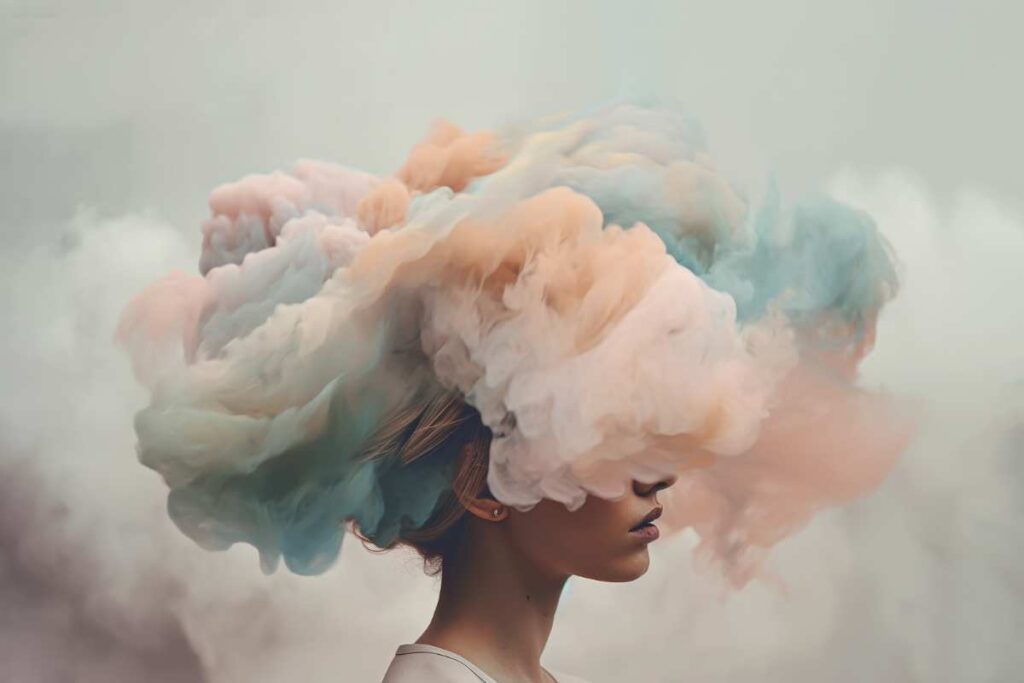“I don’t feel like myself anymore.” How many times have you come to that realization during the menopause journey? Menopausal “brain fog” (or menofog) is a real thing, but it doesn’t have to be the end of the road. While treatment options are lacking, herbs hold promise. pausitive health Guest Contributor, Clinical Herbalist Kay Sidahmed, MS, PhD. will help you explore the world of herbs and the ones that could help with your brain fog symptoms.

How to find an herbal formula to improve brain fog
First of all, it’s not your imagination! Brain fog is a real thing during the menopause journey and can be alarming. How many of these symptoms are new and frequent companions?
- reduced focus
- lower attention span
- difficulty multitasking
- being easily distracted
- mental fogginess
- increased forgetfulness
- trouble finding the right words
- inability to think clearly
While these are brain fog symptoms, clinical herbal approaches to brain fog (aka menofog) always take the bigger picture into account, ensuring the pillars of well-being are supported and balanced as well. These include:
- sleep
- stress balance
- a connection with nature
- nutrition, including hydration
- movement/physical activity
- mental, emotional, and spiritual well-being
If any of these are out of balance, our cognitive health can suffer. So, think about more than just your brain fog. Do you have issues (imbalances or deficiencies) in any of these areas?
- getting enough good-quality sleep
- chronic stress
- blood sugar and lipid (e.g., cholesterol, triglycerides) imbalances
- nutrient deficiency
- insufficient hydration
- being physically active
- absent or disrupted connection with nature
If you check any of these boxes, they could be one of the sources of your cognitive challenges and brain fog during the menopausal transition.
While you may be tempted to take an herb for lack of sleep or stress, and many women+ do take herbs based on a single menopausal symptom, that’s not necessarily the best approach. Generally speaking, medicinal herbs are most beneficial when several come together in a formula or support protocol that is customized to a person’s unique needs and individual circumstances.
To aid with menopause-related brain fog effectively, a formula blends together herbs that not only improve cognitive function and focus, but also may address areas like:
- inflammation
- liver function
- stress adaptation
- sleep
- mood
- heart health
It depends on what’s appropriate and necessary for the individual person.
Clinical herbalists are equipped with the knowledge and expertise to craft such individual and holistic support protocols.
Furthermore, they are able to source high-quality, safe, and ethically manufactured herbal products, which can otherwise easily become difficult and confusing to identify in the current herbal marketplace, which has countless products from which to choose. (You can read more on how to find a clinical herbalist at the end of this article.)
The following is a selection and description of four medicinal plants and one mushroom and their potential to address brain fog.
They all have “nootropic” activity in common, meaning they have the ability to positively affect cognitive brain function via different mechanisms of action.

Lion’s Mane – Hericium erinaceus
This versatile medicinal mushroom is known for its broad supportive effect in various tissue and organ systems.
Lions mane is a staple in the arsenal of clinical herbalists for its medicinal qualities relative to:
- mood-regulating
- memory
- cognition-enhancing function
- nerve repair support
Additionally, the mushroom is known for its blood sugar and blood pressure balancing effects, which is especially helpful when these imbalances are present as underlying brain fog factors.
Studies have indicated increased cognitive function for short-term single dose as well as longer-term use. In one of the studies, young people (age 18-45) took 1.8 g of Hericium erinaceious, and they were able to function faster just sixty minutes after taking it. And after 28 days, subjective stress also decreased in study participants.
Finding quality Lion’s mane
When you’re looking for a quality product, look for beta-glucans and diterpenes. They are parts of the mushroom, and key constituents of the mushroom’s biological activity.
They are present at varying levels in both the fruiting body and mycelium (part of the mushroom – network of fungal threads).
Both mushroom parts should ideally be present in a quality medicinal Lion’s Mane product.
While Lion’s Mane is a delicious edible mushroom adding a nice texture to meals, quality supplements from knowledgeable herbal product manufacturers are necessary for noticeable brain fog and memory support.

Rosemary – Salvia Rosmarinus
As a traditional kitchen herb, rosemary is beloved for its aromatic flavoring and digestive support.
The plant is a potent circulatory stimulant and thus increases blood flow and oxygen delivery to the brain, which enhances memory and focus, helping to clear up brain fog. This feature makes rosemary, among other medicinal activities, a key plant in herbal Alzheimer’s disease support protocols as well.
Furthermore, when rosemary is used in herbal combination products, its stimulating effect on circulation enhances the delivery of other herbs in the formula to their respective target tissues in the body.
Rosemary essential oils may help
It is worth noting that some of the clinical studies regarding rosemary’s cognition-enhancing effects use essential oils, where study participants inhale the aromatic components through the nose. For practical application, this means that simply smelling a quality rosemary essential oil bottle can lift brain fog and increase focus instantly.
Even better, if you grow a rosemary plant in your garden or on a windowsill, gently rubbing the leaves between both hands releases the aromatic oils and has a similar effect as sniffing on an essential oil bottle.
What’s missing from this aromatic oil application, however, is the herb’s circulatory stimulating activity with its associated effects, as described above.
A combination of both, internal as well as olfactorily (via smelling through your nose), rosemary products are ideal for lasting focus and memory effects.

Bacopa – Bacopa monnieri
Bacopa, also known as water hyssop, is a creeping herb in the succulent family, native to India and Sri Lanka and has a long traditional use in the healing system of Ayurveda (natural and holistic healing system).
Clinical trials have demonstrated Bacopa’s effectiveness in improving:
- attention
- cognition
- memory
- mood
In a review of six studies, dosages were 300-450 mg extracts per day.
In the other study, participants over 55 years old, were given an extract of Bacopa monnieri called BacoMind™ which has 300 mg of the herb. Memory significantly improved. Side effects included increased stools, abdominal cramps, and nausea.
Like rosemary, and as sugested by research, the plant is often included in herbal support protocols for Alzheimer’s disease due to its protective effects on the brain/nervous system.
In addition, Bacopa has gentle laxative effects and offers support for constipation due to sluggish bowels, which can be a contributing factor to brain fog.
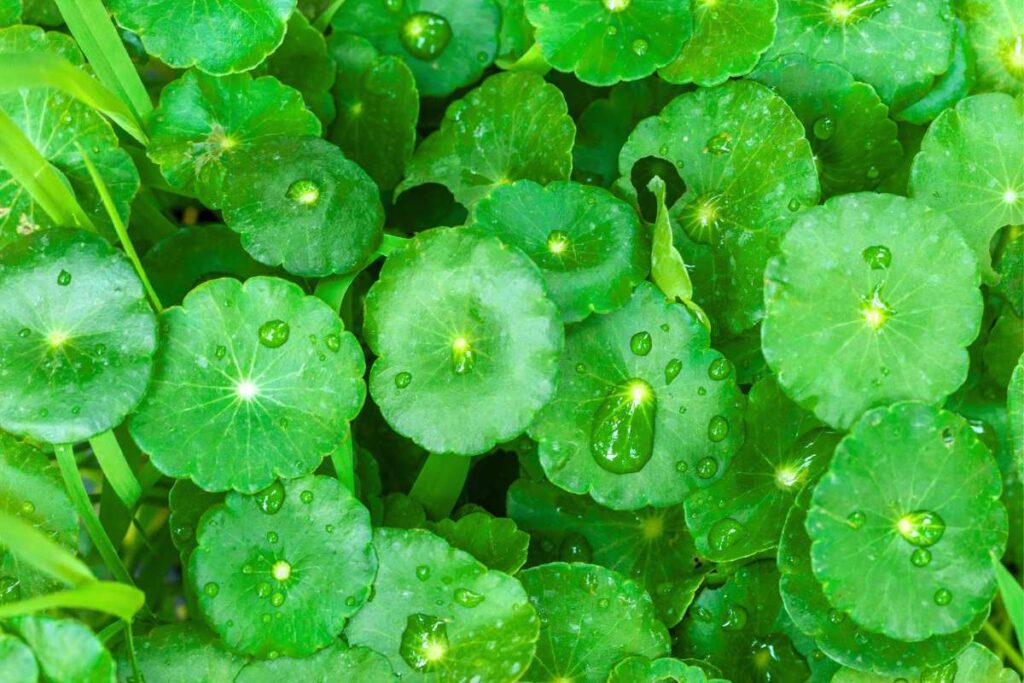
Gotu Kola – Centella asiatica
Gotu Kola is another herb with a long and rich historical use in the Ayurvedic tradition and a broad range of medicinal actions and applications. You want to look for “Gotu Kola.” Sometimes, it’s referred to as Brahmi, but that’s used interchangably with the herb we just discussed, Bacopa. So, always check the scientific name to properly identify an herbal product.
How it works
The Gotu Kola plant supports mental clarity and alertness and has traditionally been treasured as a meditation aid and a general tonic for people in their second half of life.
Research shows Gotu Kola’s ability to enhance working memory and cognition and several different ways it works have been identified that make it a valuable herb in support protocols for neurodegenerative diseases.
The patients took doses ranging from 250, 500, or 750 mg once a day for two months. The highest dose enhanced working memory.
The plant is particularly helpful during the menopausal transition since it not only aids with the various challenges of menofog, but also excels in toning connective tissue, and thus is often included in formulas when skin and vaginal tissue dryness is present.
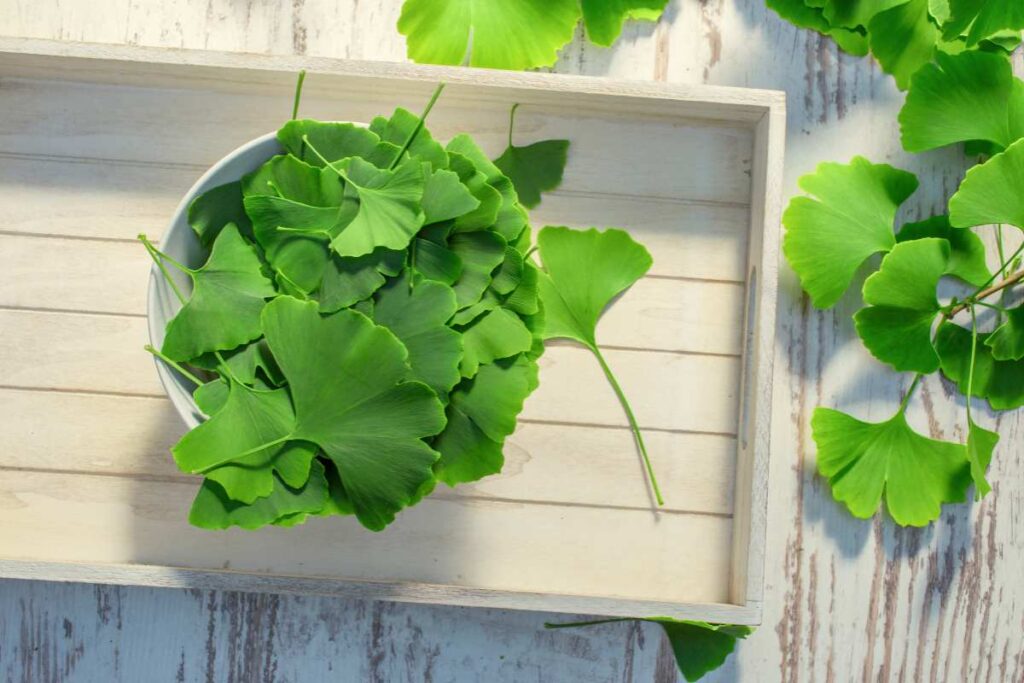
Ginkgo – Ginkgo biloba
The nuts of this “living fossil” have been applied for millennia in Traditional Chinese Medicine (TCM). However, current herbal medicine practice and associated clinical research focus on extracts from the leaves.
Ginkgo is another circulatory stimulant that improves blood flow throughout the body and the brain while also dilating (making wider or more open) blood vessels. Research on ginkgo leaf extract has supported improvements in concentration, working memory, and mental clarity (as well as benefit in ADHD).
Ginkgo should be used cautiously (if at all) because it can potentially interact with blood-thinning medication, as the herb also has anticoagulant activity.
This scenario is a good example of the importance of working collaboratively with a clinical herbalist and medical provider to ensure unwanted herb-drug interactions are avoided.

How to Find a Clinical Herbalist
Clinical herbalists are highly trained practitioners with a unique knowledge and skill set, which sets them apart from other practitioners, who may be recommending herbs in their practice but do not necessarily have the same level of in-depth training and expertise.
Unlike in Europe and other parts of the world, clinical herbalists in the US are not licensed practitioners, which is simply an unfortunate result of drastic changes in US healthcare politics in the early 20th century. This lack of licensing does by no means makes clinical herbalists less qualified or well-versed in their profession, but it can make finding a practitioner a bit more confusing for patients and women+ on the menopause journey.
Here are some pointers that can help identify a qualified clinical herbalist. Look for a practitioner who is a general member of the American Herbalist Guild (AHG) and fits one or more of these categories:
- Associate member or Registered Herbalist (RH) member of the American Herbalist Guild (AHG).
- BS in Herbal Sciences or MS in Clinical Herbal Medicine.
- Clinical herbal education of two plus years from a school/instructor who is a Registered Herbalist (RH, AHG).
Working with medicinal herbs can be very effective with regard to menopause-related brain fog as well as other symptom challenges during the hormonal transition. You can learn about other herbs that women+ use to help with other symptoms.
Herbal support can be equally beneficial on many levels while on menopause hormone treatment (MHT) when used safely under the guidance of a clinical herbalist.
The best and most meaningful support for women+ can be achieved when health practitioners from different disciplines work together with a collaborative spirit and respect for each other’s unique field of expertise.
Learn more about herbal medicine for other menopausal symptoms – sleep, mood and emotional well-being, and weight management – during this webinar by pausitive health Guest Contributor, Clinical Herbalist Kay Sidahmed, MS, PhD.
If you need additional support, join our pilot program! Our brain health content is the most popular content track for members. Get practical advice to manage brain fog.
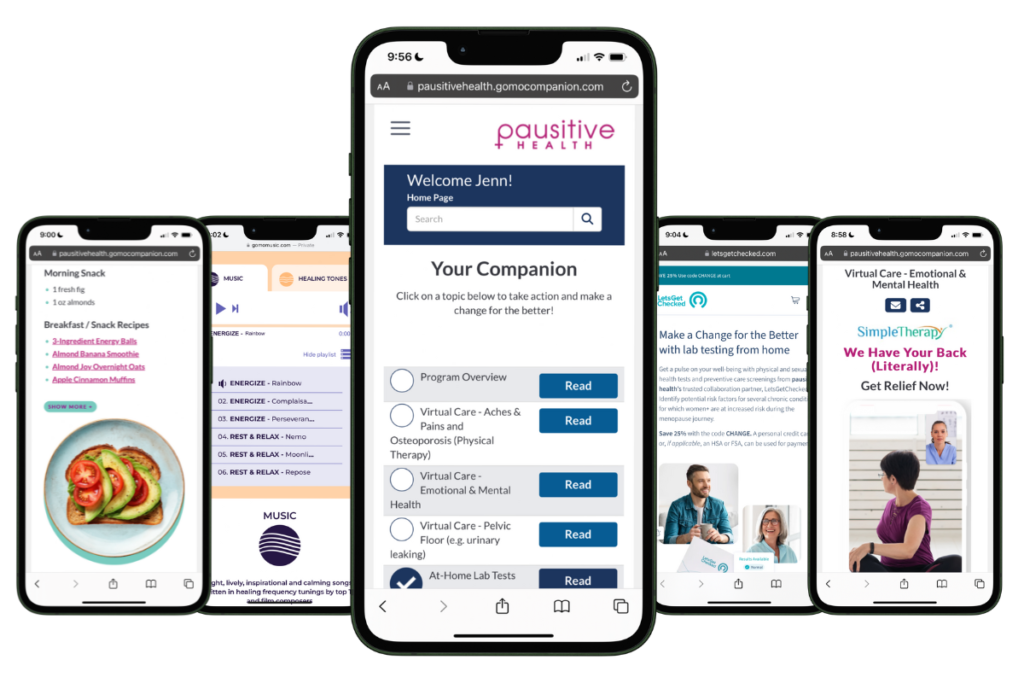
Free Support
For A Limited Time!
pausitive health offers personalized support for every stage of the menopause journey. Customize your experience with 14 evidence-based educational tracks, a diet assessment with recommendations and a food library, solutions for aches and pains, virtual care options, practical lifestyle supports, and a supportive community. All in one trusted place.
Join the pilot and be the first to know when our web-app is coming in 2026!

You have options from Mother Nature!
There are a variety of possibilities when it comes to brain fog and what herbal medicine can offer!
At pausitive health, we understand brain fog can be scary and a big hit to your quality of life at home and at work. But you don’t have to suffer. Knowledge is power. You have the ability to make a change for the better!

Kay Sidahmed, MS, PhD | Clinical Herbalist
Dr. Sidahmed holds a Master of Science degree (MS) in Clinical Herbal Medicine from Maryland University of Integrative Health (MUIH) and a MS and PhD in Agricultural Sciences from Justus-Liebig University Giessen, Germany. Kay is the founder and owner of Cura Viriditas, a clinical herbal practice where she offers individual and group consultations as well as classes and workshops.
In her work as a clinical herbalist, Kay simultaneously draws from the findings and tools of modern science as well as traditional herbal healing knowledge and wisdom from around the world. Informed by this unique intersection of tradition and science, her practice offers clients a space to reconnect with the healing gifts of plants in a way most suitable for the challenges of modern-day life. Her work focuses largely on menopause support, and she is passionate about bringing people together and creating communal and inclusive spaces of learning and exploration.
Docherty, S., Doughty, F. L., & Smith, E. F. (2023). The Acute and Chronic Effects of Lion’s Mane Mushroom Supplementation on Cognitive Function, Stress and Mood in Young Adults: A Double-Blind, Parallel Groups, Pilot Study. Nutrients, 15(22), 4842. https://doi.org/10.3390/nu15224842
Saitsu, Y., Nishide, A., Kikushima, K., Shimizu, K., & Ohnuki, K. (2019). Improvement of cognitive functions by oral intake of Hericium erinaceus. Biomedical research (Tokyo, Japan), 40(4), 125–131. https://doi.org/10.2220/biomedres.40.125
Moss, M., Cook, J., Wesnes, K., & Duckett, P. (2003). Aromas of rosemary and lavender essential oils differentially affect cognition and mood in healthy adults. The International journal of neuroscience, 113(1), 15–38. https://doi.org/10.1080/00207450390161903
Morgan, A., & Stevens, J. (2010). Does Bacopa monnieri improve memory performance in older persons? Results of a randomized, placebo-controlled, double-blind trial. Journal of alternative and complementary medicine (New York, N.Y.), 16(7), 753–759. https://doi.org/10.1089/acm.2009.0342
Pase, M. P., Kean, J., Sarris, J., Neale, C., Scholey, A. B., & Stough, C. (2012). The cognitive-enhancing effects of Bacopa monnieri: a systematic review of randomized, controlled human clinical trials. Journal of alternative and complementary medicine (New York, N.Y.), 18(7), 647–652. https://doi.org/10.1089/acm.2011.0367
Mathew, J., Paul, J., Nandhu, M.S., & Paulose, C.S. (2010). Bacopa monnieri and bacoside-A for ameliorating epilepsy associated behavioral deficits. Fitoterapia, 81(5), 315-322. https://doi.org/10.1016/j.fitote.2009.11.005
Wattanathorn, J., Mator, L., Muchimapura, S., Tongun, T., Pasuriwong, O., Piyawatkul, N., Yimtae, K., Sripanidkulchai, B., & Singkhoraard, J. (2008). Positive modulation of cognition and mood in the healthy elderly volunteer following the administration of Centella asiatica. Journal of ethnopharma
Sun B, Wu L, Wu Y, Zhang C, Qin L, Hayashi M, Kudo M, Gao M, Liu T. Therapeutic Potential of Centella asiatica and Its Triterpenes: A Review. Front Pharmacol. 2020 Sep 4;11:568032. doi: 10.3389/fphar.2020.568032. PMID: 33013406; PMCID: PMC7498642.
Arribas-López, E., Zand, N., Ojo, O., Snowden, M. J., & Kochhar, T. (2022). A Systematic Review of the Effect of Centella asiatica on Wound Healing. International journal of environmental research and public health, 19(6), 3266. https://doi.org/10.3390/ijerph19063266
Băjenaru, O., Prada, G., Antochi, F., Jianu, C., Tudose, C., Cuciureanu, A., Docu, A. A., Perrot, V., Avram, M., & Tiu, C. (2021). Effectiveness and Safety Profile of Ginkgo biloba Standardized Extract (EGb761®) in Patients with Amnestic Mild Cognitive Impairment. CNS & neurological disorders drug targets, 20(4), 378–384. https://doi.org/10.2174/1871527320666210208125524
Shakibaei, F., Radmanesh, M., Salari, E., & Mahaki, B. (2015). Ginkgo biloba in the treatment of attention-deficit/hyperactivity disorder in children and adolescents. A randomized, placebo-controlled, trial. Complementary therapies in clinical practice, 21(2), 61–67. https://doi.org/10.1016/j.ctcp.2015.04.001
You may also like...
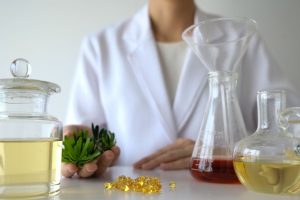
Which Herbal Remedies Offer Relief From Hot Flashes And Other Menopause Symptoms?
Can herbal remedies help menopause symptoms like hot flashes? Get the latest science, risks, and reported health benefits.

Struggling With Menopause Brain Fog? How Menopause Impacts Your Brain
Do you feel like you’re losing your mind? Menopause changes your brain and ovaries. Learn how to power through brain fog for mental clarity.

A Guide To Over-the-Counter (OTC) Menopause Supplements: Relief in a Bottle?
The menopause supplement guide provides information on key non-hormonal ingredients for symptom relief so you and your doctor can determine which one(s) may or may not work for you.

